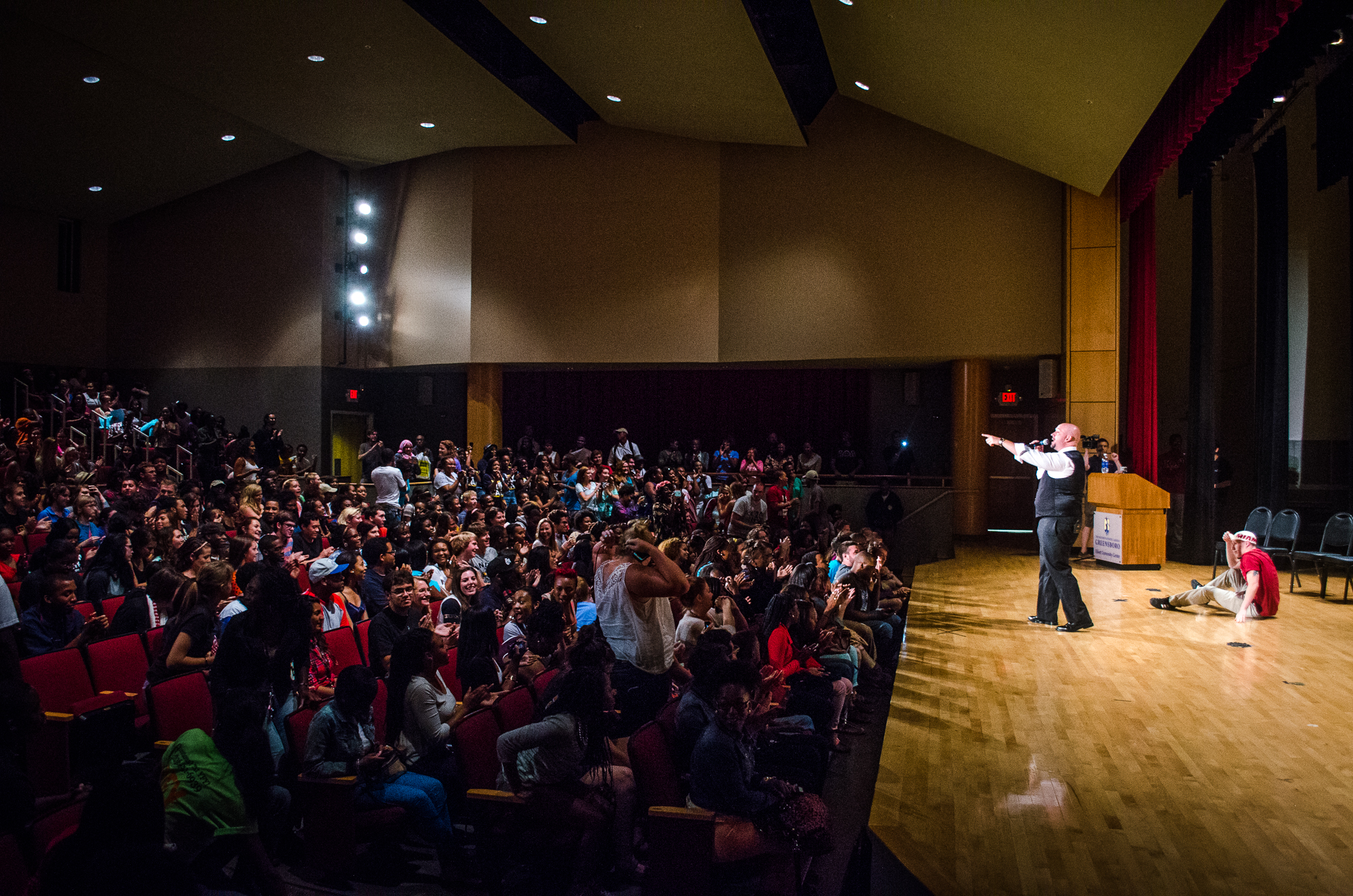What Price Should a Stage Hypnotist Charge?
I had a friend call me this morning who's a consulting hypnotist. She doesn't do stage shows. She said, "I just thought of you. I wanted to call and say hi. I just drove past a place that had a sign out front, and the sign said, 'Stage hypnosis tonight. Tickets $5.' What price should a stage hypnotist charge? Because I'm pretty sure that's not it."
I laughed and said, "Really?" And she said, "Yep." To which I replied, "You know that I just paid $7.75 for my Starbucks chai and a coffee cake, right?"
She laughed. She knew what I meant right away. If you are a stage hypnotist, you cannot be charging $5 for a ticket to your show. It immediately conveys the sense that your show isn't worth much. Just think about it: an hour to an hour and a half of entertainment for less than a cup of coffee and a pastry? No way!
So What Price Should a Stage Hypnotist Charge?
How do you determine what price a stage hypnotist should charge? It's the central question, but it's not necessarily the first question you should be asking. I think there are two main factors that you must consider when determining pricing:
- The market you're operating in.
- The value your show brings to the consumer.
Let's start with understanding the market you're in. Please indulge me in telling an anecdotal story.
About two years into my stage hypnotism career, I was attending a conference that brings together entertainers and college buyers who are looking for entertainers. It's the final day of this three day conference. In fact, it's about 30 minutes before we close up and are all done. A gentleman walks up to my table.
He has purposely taken his name badge off, so I don't know who he is or where he is from. He saunters up to me, and in a friendly voice says, "Paul, I have a question for you."
"Let me have it" I responded.
He said, "How can you justify only charging a thousand dollars for your show?" I was running a special at my table that offered a show for a thousand dollars if you booked it while we were at the conference. After the conference was done, the discounted offer was no longer valid.
I answered, "Well, that's easy. This is a regional conference, and I actually live in this region, so for any school that's at this regional conference that books me, I can drive to the gig, I don't have to pay air fare. I also probably won't need a hotel. So really all I'm charging for is forty to eighty dollars at the most worth of gas. I drive out, then I just drive home. So the other nine hundred plus dollars is profit. That's a pretty good day's work."
And at the time I had only been in stage hypnotism for a two years. The idea of being able to drive an hour to two hours, maybe three at the most, work for an hour and a half, and then drive back home with over $900 left over in my pocket, was an incredible blessing to me.
That's how I explained it to him. And he said, "Okay, I get that. But here's the thing..." And his tone changed a little bit, and he said, "I don't even get out of bed for less than $1,500."
"Well, how very nice for you," I said, "But here's the thing: how long have you been doing stage hypnotism?"
I had figured him out at this point, right? He was a stage hypnotist and he was mad that I was coming way in under him on price. He said, "I've been doing stage hypnosis for almost 20 years now."
I said, "Okay, so are you saying that your nearly two decades of experience has the same level of value as my two years of experience?"
To which he answered, "Well, no, but I think it's important that we all be on the same page about these things."
I said, "Well, so do I. So let's get on the same page about how we create value, not pricing. I have two years of experience. I love what I do, I'm passionate about what I do, but I'm not going to claim that I'm as good at it at this point in my career as you are.
So I think you should be able to say you don't get out of bed for less than $1,500, and I, at this point in my career, should be grateful to go and work for a thousand dollars. I just don't see what the big deal is, here. You know, we're talking about a thousand dollars for 90 minutes of our time." And he said, "Yes. Yes, I understand."
But he didn't understand, because he just couldn't let it go. He kept circling back to the same central idea of "protecting the market" by keeping prices consistent. What he really wanted to do was to fix the price, and in doing so protect himself. He wanted to live in a professional world where we were "all on the same page with each other" in his words, and that we were holding a price floor steady. Nobody would work for less than this amount of money.
But the market doesn't work that way. Different buyers have different budgets, and different brands within the markets have different valuations. You don't pay the same price for a Toyota as for a Ferrari.
What Price Should a Stage Hypnotist Charge? Well, How Much Value Do You Bring?
The key concept, really, is how do you determine your value, right? There's a quantity factor, and a quality factor.
How many people are you entertaining? How many people get to enjoy the value of your entertainment? Sometimes I do shows for as little as 40 people. Sometimes I've done shows for as many as 1600 people. Even though I'm doing the same show either way, there's a massively different level of ultimate value that's being enjoyed between 40 people and 1600 people.
Is your show an hour long? Is your show an hour and a half long? How long you are keeping people entertained is another quantity factor related to value.
How much production value do you bring to your show? Do you have a lot of lights and sound and props and lots of high end production stuff, or do you just pretty much walk out on stage, grab a microphone and do a hypnosis show? Production value is a quality factor.
Ultimately, the biggest value factor is: just how good are you?
Do you get up there and rock it, or do you fumble and stumble because you're new to stage hypnotism and you're still polishing your skills. Everybody's level of value is different, and it's just not appropriate to think that we all can charge the same price. There's nothing wrong with being a Toyota. They are dependable and reliable, and there are many more of them on the road than there are Ferraris. The key is to not charge Ferrari money when you don't deliver the Ferrari experience.
You have to take some time and figure out how you are going to create value for other people. How are you going to deliver that value to your client? What is that value worth to you, and what is that value worth to them? For you, it's your time, your experience, your production value, all that kind of stuff. For them, it's judging those same things against a market of your competitors, and are you bringing as much value as the next person for the same price or a lower price?
That's what you have to really spend some time thinking about. There's some mental work that has to happen there. I think you do yourself a disservice if you went through all this training and practice and study and designed a show, and then you implement that show for less than it cost the average person to get a cup of coffee and a pastry. I also think you shouldn't just be assuming that because you've got a certificate on your wall, that you did your x number of hours of training, that you can just automatically start charging three grand, four grand, five grand for a show.
You have to think about what value you bring to what you do and to the people you do it for. Before you choose what price to charge for your stage show, spend some time thinking about the value you bring to your clients. Pricing tends to feel pretty straightforward to folks, while value can be a better more difficult to qualify, but it's important that you work out some level of appreciation for the work you do as a hypnotist.
Because at some point, a potential client is going to ask you to justify the price you are charging.
That justification should not be a canned response like, "That's the standard in our industry." Your response should be a confident, heartfelt answer about the value you will bring to them. When you communicate that, the lead will be more likely to take action and choose you.







Trackbacks & Pingbacks
[…] https://www.besthypnosistraining.com/wha… […]
Comments are closed.